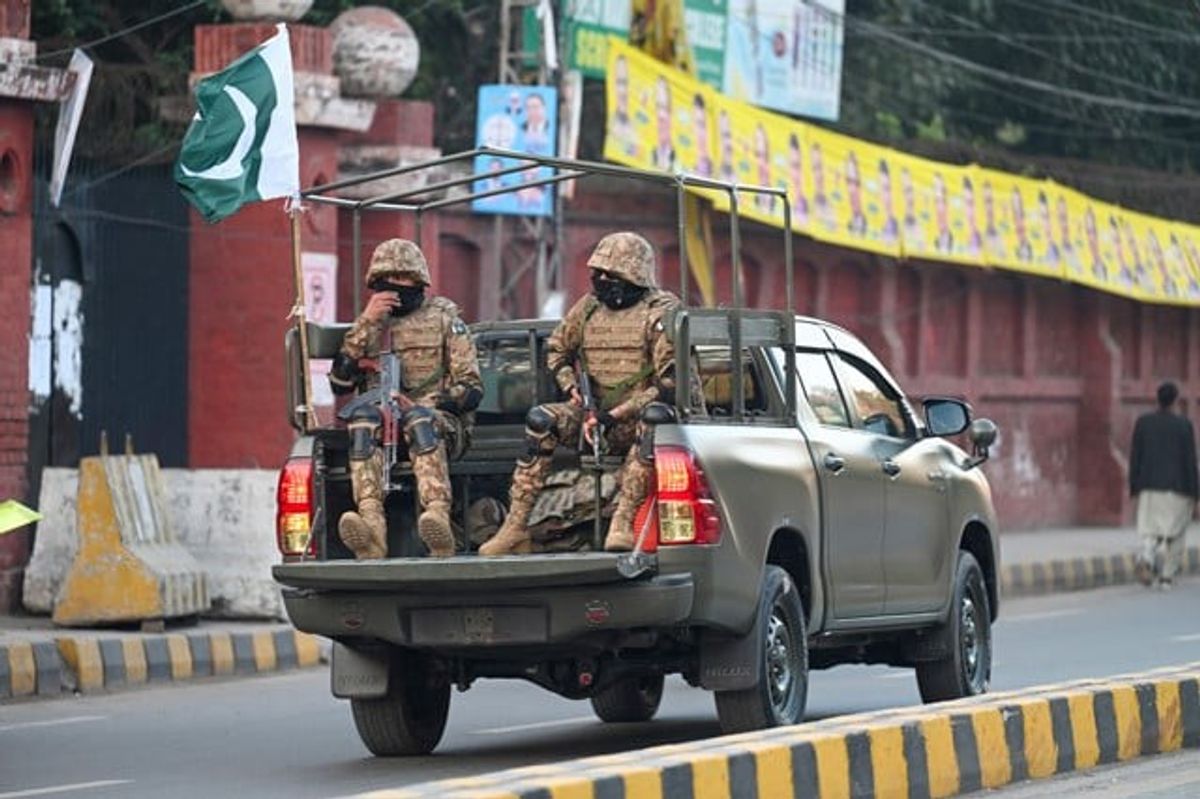Pakistan moves to expand anti-terror powers amid opposition outcry
Govt proposes amendments to anti-terror law allowing preemptive arrests; PTI calls changes an attack on fair trial rights

Javed Hussain
Correspondent
I have almost 20 years of experience in print, radio, and TV media. I started my career with "Daily Jang" after which I got the opportunity to work in FM 103, Radio Pakistan, News One, Ab Tak News, Dawn News TV, Dunya News, 92 News and regional channels Rohi TV, Apna Channel and Sach TV where I worked and gained experience in different areas of all three mediums. My journey from reporting to news anchor in these organisations was excellent. Now, I am working as a correspondent with Nukta in Islamabad, where I get the opportunity of in-depth journalism and storytelling while I am now covering parliamentary affairs, politics, and technology.

Military troops patrol near a polling station during Pakistan's national elections in Lahore on February 8, 2024.
AFP
Federal government presents Anti-Terrorism Amendment Bill 2024 in National Assembly
The amendment revives expired Anti-Terrorism Act powers, allowing preemptive three-month detention of terror suspects on credible intel
The bill has drawn fierce criticism from opposition leaders, particularly the Pakistan Tehreek-e-InsafPakistan's government presented on Friday the Anti-Terrorism Amendment Bill 2024 in the National Assembly, aiming to expand the powers of law enforcement to combat terrorism.
The bill, tabled by Federal Minister for Law Senator Azam Nazir Tarar, has been referred to the relevant standing committee for further review.
The amendment seeks to revive expired provisions from the Anti-Terrorism Act of 1997, permitting the government to preemptively detain individuals suspected of terrorism for up to three months, subject to credible intelligence.
Under the proposed amendments, security forces, including the Pakistan Army and civil armed forces, would have the authority to arrest and detain individuals suspected of involvement in terrorist activities. The detainees could be held for an initial period of three months without formal charges based on "plausible information and reasonable suspicion" to enable detailed investigations.
Furthermore, the amendment would facilitate the creation of high-level Joint Investigation Teams (JITs) tasked with probing allegations against detainees, drawing representatives from police, intelligence agencies, civil armed forces, and other security agencies.
The bill’s statement of objectives underscores the current “unprecedented” security challenges, especially in Balochistan, where insurgent and terrorist networks have intensified their operations. During a recent federal cabinet briefing, the Ministry of Interior presented a grim picture of Balochistan’s security crisis, describing it as a situation “beyond the capacity of existing legal frameworks.”
According to cabinet sources, insurgent groups have adopted increasingly coordinated tactics, resulting in significant loss of life and damage to critical infrastructure across the province.
To respond effectively, the Ministry of Interior called for bolstered legal provisions, including reviving Section 11 EEEE, a preventive detention clause added in 2014 but lapsed in 2016. The proposed amendment, valid for a period of two years if passed, would give security forces additional authority to detain individuals considered to be serious national security threats, potentially disrupting terrorist plots before they materialize. It would also authorize JITs to conduct thorough, coordinated investigations and gather actionable intelligence.
Amendment unconstitutional: PTI
However, the bill has drawn fierce criticism from opposition leaders, particularly the Pakistan Tehreek-e-Insaf (PTI) party. Waqas Akram Sheikh, a PTI spokesperson, condemned the amendment as unconstitutional, citing concerns over the right to a fair trial. Sheikh argued that the bill directly violates Article 10-A of the Constitution, which guarantees protections against arbitrary arrest and detention.
“This bill undermines the right to a fair trial as provided under Article 10-A,” Sheikh told Nukta. “It’s an admission that cases, especially from May 9 and October 6, are politically motivated and lack merit. The government is introducing this amendment to avoid court scrutiny on these baseless cases.”
Sheikh further argued that the bill effectively prevents courts from granting bail, infringing on the judicial process and enabling detention based on political motives. "The amendment obstructs bail in all these mala fide cases," he added.
If passed, the bill would grant Pakistani authorities broad latitude to act on credible intelligence, ostensibly to preempt threats. Opponents fear that these sweeping powers could result in civil liberties violations, pointing out that the revived section lacks sufficient safeguards to prevent misuse. The proposed amendment would also empower the government to establish new JITs, integrating intelligence and law enforcement to enhance counterterrorism efforts.
The bill has been sent to the standing committee for further consideration, where amendments or revisions may be suggested. Proponents of the bill argue that the expansion of legal powers is necessary for the government to counter the intricate web of insurgent and terrorist groups operating in Pakistan’s border regions.






Comments
See what people are discussing